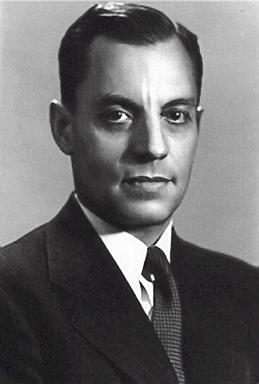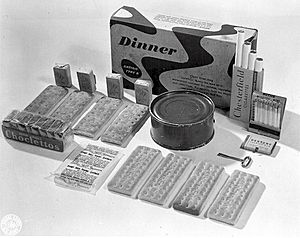Ancel Keys facts for kids
Quick facts for kids
Ancel Keys
|
|
|---|---|

Keys in 1945
|
|
| Born |
Ancel Benjamin Keys
January 26, 1904 |
| Died | November 20, 2004 (aged 100) |
| Nationality | American |
| Citizenship | United States |
| Alma mater | University of California at Berkeley, Scripps Institution of Oceanography, Kings College, Cambridge |
| Known for | Human Nutrition, K-ration, Mediterranean diet |
| Spouse(s) | Margaret Keys |
| Scientific career | |
| Fields | Human Nutrition, Public Health, epidemiology |
| Institutions | University of Minnesota |
| Academic advisors | August Krogh |
Ancel Benjamin Keys (born January 26, 1904 – died November 20, 2004) was an American scientist. He studied how the food we eat affects our health.
Keys believed that eating too much saturated fat could cause heart disease. Today, many health groups agree with this idea.
He also studied what happens when people don't eat enough. He wrote a book called The Biology of Human Starvation in 1950. This book is still an important source of information on the topic.
Keys looked into heart disease around the world. He is famous for two types of diets. One was the K-ration, which were balanced meals for soldiers in World War II. The other was the Mediterranean diet, which he helped make popular with his wife, Margaret.
Ancel Keys' Early Life
Ancel Keys was born in Colorado Springs, Colorado. In 1906, his family moved to San Francisco. They moved just before the big 1906 San Francisco earthquake. After the earthquake, his family moved again to Berkeley, California, where he grew up.
Ancel was very smart as a boy. A famous psychologist named Lewis Terman said he was "gifted."
When he was young, he left high school for a while. He worked different jobs, like shoveling bat poop in Arizona. He also worked in a mine and a lumber camp. Later, he finished high school and started college. He went to the University of California at Berkeley in 1922.
Later Years and Passing
In 1936, Ancel Keys started working at the Mayo Foundation. There, he hired Margaret Haney, who was a medical technologist. They got married in 1939 and had three children.
Margaret and Ancel wrote three books together. Two of their books became very popular. They traveled all over the world, visiting places like Japan and South Africa. They collected information for Ancel's studies, such as the Seven Countries Study.
Keys received several important awards for his work. These included the Order of the Lion of Finland in 1963. He also got the McCollum Award in 1967. In 2001, he received an honorary science degree.
Ancel Keys passed away on November 20, 2004. He was almost 101 years old. A year before he died, he left Pioppi, a village in Italy. He had lived in this village on the southwest coast of Italy for 28 years.
Developing K-rations

In 1937, Keys started teaching about the human body at the University of Minnesota. He also started a special lab there. His early research on how the body works led to a job with the U.S. Army.
The Army wanted to create a new type of food for soldiers. This food needed to be easy to carry and last a long time. It also had to give soldiers enough energy, especially for paratroopers.
Keys first bought ingredients from a local grocery store in Minneapolis. He used hard biscuits, dry sausage, hard candy, and chocolate. The final K-ration was a bit different from his first ideas. But most of his suggestions were used.
These rations weighed only 28 ounces (about 790 grams). But they gave soldiers 3200 calories each day. Many people say the K-ration was named after Keys. It became very successful and was a main food source for soldiers.
See also
 In Spanish: Ancel Keys para niños
In Spanish: Ancel Keys para niños
 | Bayard Rustin |
 | Jeannette Carter |
 | Jeremiah A. Brown |

